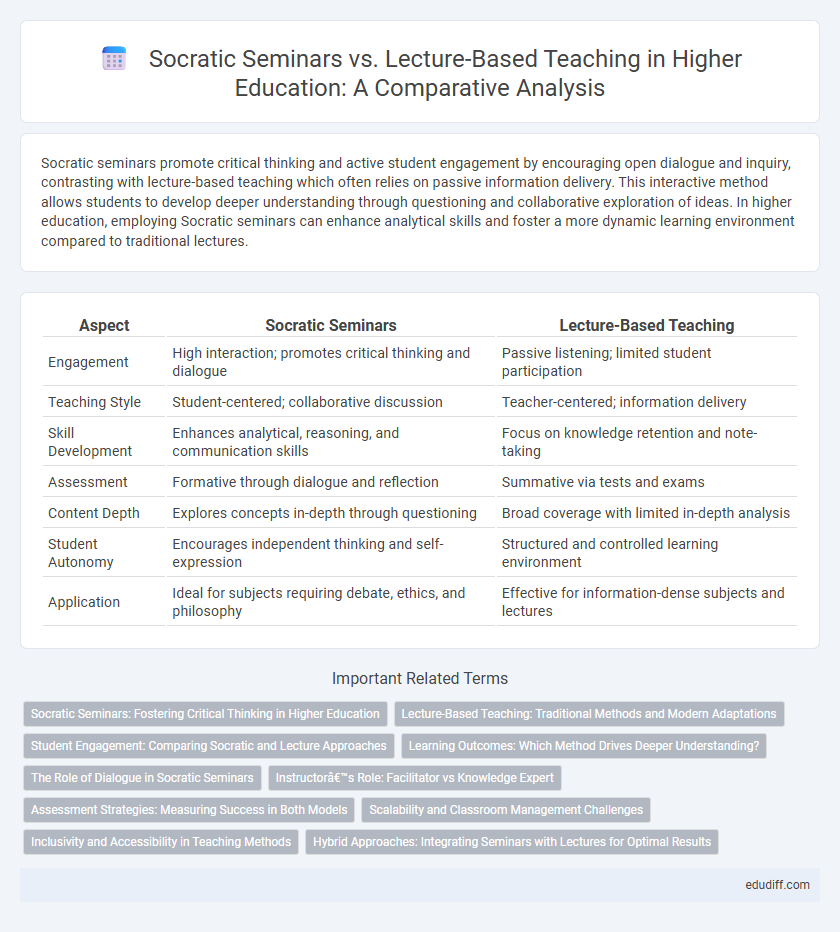Socratic seminars promote critical thinking and active student engagement by encouraging open dialogue and inquiry, contrasting with lecture-based teaching which often relies on passive information delivery. This interactive method allows students to develop deeper understanding through questioning and collaborative exploration of ideas. In higher education, employing Socratic seminars can enhance analytical skills and foster a more dynamic learning environment compared to traditional lectures.
Table of Comparison
| Aspect | Socratic Seminars | Lecture-Based Teaching |
|---|---|---|
| Engagement | High interaction; promotes critical thinking and dialogue | Passive listening; limited student participation |
| Teaching Style | Student-centered; collaborative discussion | Teacher-centered; information delivery |
| Skill Development | Enhances analytical, reasoning, and communication skills | Focus on knowledge retention and note-taking |
| Assessment | Formative through dialogue and reflection | Summative via tests and exams |
| Content Depth | Explores concepts in-depth through questioning | Broad coverage with limited in-depth analysis |
| Student Autonomy | Encourages independent thinking and self-expression | Structured and controlled learning environment |
| Application | Ideal for subjects requiring debate, ethics, and philosophy | Effective for information-dense subjects and lectures |
Socratic Seminars: Fostering Critical Thinking in Higher Education
Socratic seminars in higher education prioritize critical thinking by encouraging students to engage deeply with texts through dialogue and questioning. This method promotes active learning, self-reflection, and the development of analytical skills, fostering a collaborative environment where diverse perspectives are valued. Research shows that students participating in Socratic seminars demonstrate enhanced reasoning abilities and greater retention compared to traditional lecture-based teaching.
Lecture-Based Teaching: Traditional Methods and Modern Adaptations
Lecture-based teaching remains a foundational approach in higher education, characterized by structured content delivery and direct instructor-to-student communication. Modern adaptations incorporate multimedia tools, interactive polls, and real-time feedback systems to enhance engagement and comprehension. Despite challenges in fostering active participation, this method efficiently transmits complex knowledge to large cohorts.
Student Engagement: Comparing Socratic and Lecture Approaches
Socratic Seminars promote active student engagement by encouraging critical thinking, dialogue, and collaborative inquiry, leading to deeper comprehension and retention of material. In contrast, Lecture-Based Teaching often results in passive learning, limiting student interaction and reducing opportunities for immediate feedback and personalized understanding. Empirical studies indicate that classrooms utilizing Socratic methods demonstrate higher levels of student participation and improved analytical skills compared to traditional lecture settings.
Learning Outcomes: Which Method Drives Deeper Understanding?
Socratic Seminars encourage critical thinking and active participation, resulting in improved retention and deeper comprehension of complex concepts compared to Lecture-Based Teaching, which often fosters passive learning. Studies indicate that students engaged in Socratic dialogue develop stronger analytical skills and the ability to synthesize information. This method enhances long-term learning outcomes by promoting inquiry and collaborative knowledge construction.
The Role of Dialogue in Socratic Seminars
Socratic seminars prioritize dialogue as the central method for fostering critical thinking and deep understanding, encouraging students to engage actively with diverse perspectives. Unlike lecture-based teaching, which delivers information passively, Socratic seminars require participants to articulate reasoning, question assumptions, and collaboratively construct knowledge. This interactive process enhances comprehension, promotes reflective thinking, and cultivates communication skills essential for higher education success.
Instructor’s Role: Facilitator vs Knowledge Expert
In Socratic Seminars, the instructor acts as a facilitator by guiding student inquiry and promoting critical thinking without directly providing answers, fostering a collaborative learning environment. In contrast, lecture-based teaching positions the instructor as the knowledge expert who delivers information and directs the learning process. This fundamental difference impacts student engagement and the development of analytical skills, with facilitation encouraging deeper understanding through dialogue.
Assessment Strategies: Measuring Success in Both Models
Socratic seminars prioritize formative assessment through observation of critical thinking, dialogue participation, and reflective self-assessment, fostering deeper understanding and student engagement. In contrast, lecture-based teaching often relies on summative assessments such as standardized tests and quizzes to measure knowledge retention and comprehension. Combining both strategies can provide a comprehensive evaluation of student success by balancing immediate feedback with measurable academic outcomes.
Scalability and Classroom Management Challenges
Socratic Seminars often face scalability issues in larger classrooms due to the intensive student participation and individualized attention required, making it challenging to manage discussions effectively. Lecture-Based Teaching scales more easily to large groups by delivering content uniformly, but this approach may limit student engagement and critical thinking opportunities. Classroom management during Socratic Seminars demands skilled facilitation to balance diverse viewpoints and maintain order, whereas lectures focus more on controlling behavior and ensuring attentiveness.
Inclusivity and Accessibility in Teaching Methods
Socratic Seminars promote inclusivity by encouraging diverse student voices through open-ended questioning and collaborative dialogue, accommodating varied learning styles and fostering critical thinking. Lecture-Based Teaching often limits accessibility as it centers on passive information delivery, which may not engage students with different linguistic, cognitive, or cultural backgrounds effectively. Implementing interactive discussion methods within Socratic Seminars enhances equitable participation and supports learners requiring differentiated instruction.
Hybrid Approaches: Integrating Seminars with Lectures for Optimal Results
Hybrid teaching approaches that integrate Socratic Seminars with lecture-based methods enhance student engagement and critical thinking by combining interactive dialogue with structured content delivery. This blended model promotes deeper understanding through active participation, while lectures provide foundational knowledge efficiently. Research indicates that such integration leads to improved academic performance, higher student retention rates, and the development of advanced analytical skills.
Socratic Seminars vs Lecture-Based Teaching Infographic

 edudiff.com
edudiff.com